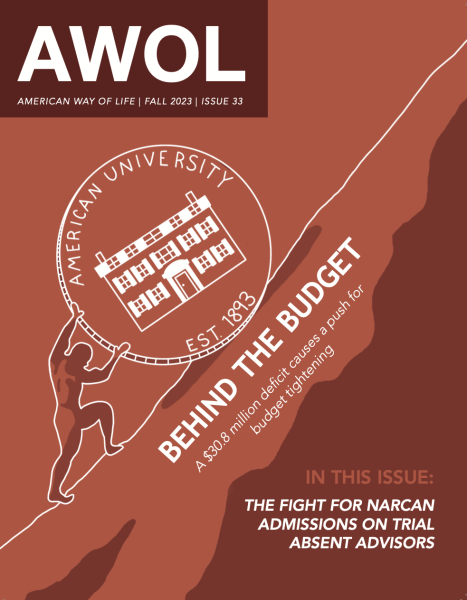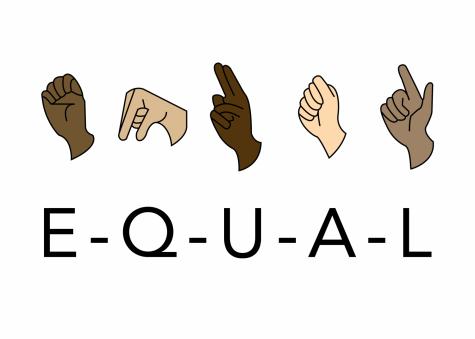Fighting Racism in Grading: Will Anti-Racist Pedagogy Fix Freshman Writing Classes at AU?
One AU Professor is showing how labor-based grading contracts can help alleviate the stress freshmen feel when writing college papers.
This story first appeared in the Fall 2019 print edition of AWOL.
Should students be allowed to use different forms of English in their writing? Is Black vernacular English equivalent to the English used in academic discourse? Should professors grade students lower for using non-standard English in their papers?
A recent workshop at American University grappled with these questions. Last February, Neisha-Anne Green and Lacey Wooton of the AU Writing Program invited Professor Asou Inoue from the University of Washington Tacoma to present his workshop “Grading Ain’t Just Grading.”
The optional workshop, which every school at AU contributed funding for, and its follow-up in August was completely filled, according to Wooton. Overall, the workshops were well received by the attendees.
In this workshop, Inoue introduced anti-racist grading pedagogy, which focuses on how professors in freshman writing courses can be more inclusive of diverse writing styles. Inoue advocated for moving away from standard-based grading and implementing more accommodating grading practices, including in-class workshops that help students identify problems in their writing.
“The way we teach and evaluate writing might not be fair to different students,” Wooten said. Such differences could include socioeconomic background. “The reality is that the discourse in college writing, in general, is a particular type, and it assumes and favors a white, upper-class background.”
Following Inoue’s anti-racist grading pedagogy, professors who attended the workshop are beginning to implement more holistic approaches, such as workshopping drafts in class, into their syllabi. They’re also starting to take students’ different writing abilities into consideration, especially differences in those writing abilities due to socioeconomic factors.
“I still need to hold my students accountable for the learning outcomes of Writing 100 and what they need to be learning to become successful writers in college,” said Professor Amanda Choutka of the writing department. “However, I think there is a real danger in grading students on what I haven’t taught them before.”
One attendee at the follow-up workshop created a disturbance and was asked to leave the premises. Wooton believes this disruption was linked to a series of articles published by The College Fix, a conservative news outlet focused on higher education. The articles criticize the labor-based grading aspect of Inoue’s work, implying that it detracts from recognizing the quality of a student’s work.
The College Fix did not reach out to AU’s professors for comment after publishing an article claiming that AU was training professors not to judge the quality of writing when grading, according to Choutka.
The article largely criticizes anti-racist grading for not grading correctness in student work, Choutka said.
“We’re still grading students on correctness,” Choutka said. “One thing Inoue says that resonates with us is that we need to be inclusive of the Englishes students have when they come into our classroom, and we need to think about how that student wants to be held accountable.”
Professors need to be inclusive of all varieties of English because there are no “bad Englishes,” Inoue said in his article “Antiracist Writing Assessment Ecologies.” Every form of English, from Black Vernacular to Spanglish, is governed by rules and is not inferior to the English used in academic discourse, according to Inoue.
This was one focus of the workshop, according to Choutka. The workshop explained how the white dialect of English is enforced in higher institutions, particularly through grading in freshman writing courses.
To fix this, Inoue suggested labor-based grading contracts, which give more weight to the effort students put into the class rather than the final product.
In his book, “Labor-Based Grading Contracts,” Inoue includes a sample contract from one of his classes. In the sample, a student will earn a B in the course for attending at least 84% of classes, allowing five missed classes in the semester, in addition to submitting at most five assignments late. The contract contains extra credit assignments that a student may complete to earn an A in the course.
Because the contract is based more on completing assignments than grading the content, submitted assignments will get a 100%. This system allows students to earn the grade they want and be able to know their standing at any point in the semester, according to Inoue.
Adam Tamashasky, a college writing professor, is the only professor who has implemented the labor-based grading contract so far after attending the workshop. He says the labor-based grading has created a less stressful environment in his classroom and allows students to take greater risks with their work compared to if they were under the pressure of standard-based grading.
“[Inoue] asks a question in his book, ‘Should every student have the same access to the highest grade in class?’” Tamashsky said, “If the answer is yes and you realize people have come in with unequal educational backgrounds, then a standards-based classroom prevents that.”
The difference in the diversity of AU and UW Tacoma, where Inoue teaches, is an important factor to consider when conducting labor-based grading, Tamashasky said. UW is comprised of more low-income, underprivileged groups than AU, which has a majority of students coming from privileged backgrounds where the English that is used in academic settings is taught.
“Mechanical grammatical standards are not high on the [conventional] rubric. A student’s grades are not largely based on those standards,” Tamashasky said. “Changing to labor-based isn’t doing much anti-racist pedagogy, but what I think I’m doing is pulling the stress away that [students] feel when they sit down to do a paper.”
Tamashasky devoted the first class of the semester to explaining labor-based contracts, said Benjamin McNutt, a student in Tamashasky’s class. Tamashasky told the class that freshman writing courses are designed to bring everyone up to speed on basic college writing proficiency and that labor-based grading can help that.
“[Tamashaky] said that when teachers or professors try to teach “academic writing” what they’re really teaching is “white writing” as academia has long been predominantly white in makeup and in style,” McNutt said.
Tamashasky explained that labor-based grading removes the punishment of low grades for students who come from lower socioeconomic backgrounds and gives them the opportunity to improve their grade through in-class workshops and focused peer review.
“I think the labor-based contract is perfect for a first semester writing course,” McNutt said. “I feel less stress in writing my papers than any of my peers in non-labor-based [grading] writing courses.”
Maaz Qureshi is a junior studying International Relations.












